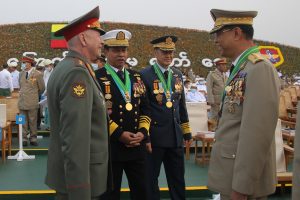The leader of Myanmar’s military junta arrived in Moscow on Sunday to attend a security conference, his second known trip abroad since he seized power in a coup on February 1.
Citing the state-run broadcaster MRTV, Agence France-Presses reported that Sen. Gen. Min Aung Hlaing left the capital Naypyidaw on a special flight on Sunday to attend the Moscow Conference for International Security and arrived late the same day. The general was attending at “the invitation of Russian Defense Minister,” MRTV said.
Min Aung Hlaing’s trip to Russia comes after he flew to Jakarta to attend the April 24 ASEAN Leaders Meeting convened to address the crisis in Myanmar. Since the coup, the country has descended into turmoil. Myanmar’s junta has been shunned and sanctioned by most democracies of the West, while ethnic conflicts have flared across the country, and people have taken to the streets en masse to protest the military takeover.
Since the coup, at least 871 people have been killed by the security forces and more than 6,000 detained, according to the Assistance Association for Political Prisoners, a local advocacy group, and the country’s crisis shows no sign of resolution.
Writing on Twitter, Zachary Abuza of the U.S. Naval War College said that the journey was a sign that the junta chief was “feeling confident enough for a trip not just abroad, but out of the region.” He also suggested that the main agenda of the trip was not hard to discern.
Russia has long been an arms supplier of choice to Myanmar’s military. The country purchased an estimated $1.5 billion in military hardware from Russia from 1999 to 2018, accounting for 39 percent of its total arms imports, according to the Stockholm International Peace Research Institute. Among its most recent purchases were a dozen MiG-29 fighter jets, which will soon be joined by six Su-30 jets purchased in 2019. Shortly before the coup, Myanmar’s government signed contracts for Russia’s Pantsir-S1 surface-to-air missile system and a fleet of surveillance drones.
Since the coup, military ties between Russia and Myanmar have only grown closer as the junta returns to the cocoon of Western isolation from which it emerged a decade ago. On March 27, Russia’s Deputy Minister of Defense Alexander Fomin was the highest-ranking foreign official to attend Myanmar’s Armed Forces Day parade in the capital Naypyidaw. Against a backdrop of violent crackdowns by the military – more than 100 people were killed on Armed Forces Day – Fomin held talks with Min Aung Hlaing in which he referred to Myanmar as a “reliable ally and strategic partner in Southeast Asia.”
Then, last month, Myanmar’s air force commander, Gen. Maung Maung Kyaw visited Moscow, which included a stop at HeliRussia, the country’s top helicopter exhibition. He also reportedly discussed with Russian officials plans for fresh military procurements.
Artyom Lukin and Andrey Gubin wrote recently, Russia’s support for Myanmar’s military government was “driven by the desire to keep lucrative military contracts and possibly gain a foothold in the Indian Ocean.”
Min Aung Hlaing’s trip to Russia came just days after the United Nations General Assembly (UNGA) voted overwhelmingly to formally condemn the February 1 coup. In addition to calling for the return of democratic government, the nonbinding resolution also urged “all Member States to prevent the flow of arms into Myanmar.” The UNGA approved the resolution by a vote of 119 to 1, with 36 countries abstaining. The only nation to vote against U.N. resolution was Belarus, which, as the advocacy group Justice for Myanmar has documented, has also previously sold weapons to Myanmar.
This is just the fourth time that the UNGA has taken such a similar step since the end of the Cold War, after similar condemnations of military coups in Haiti in 1991, Burundi in 1993, and Honduras in 2009.
Human rights advocates applauded the resolution. After the vote, Tom Andrews, the U.N. special rapporteur on the situation of human rights in Myanmar, wrote on Twitter that the UNGA’s condemnation was significant “because of how strongly it rebuked the junta” and because no member of the U.N. Security Council voted against it. “This means that the UNSC should now take action by imposing an arms embargo, sanctions & measures to hold the junta accountable,” he wrote.
However, if no UNSC member voted against the resolution, neither did they all support it. Russia was among the countries that abstained from the vote, as was China, another key supplier of weapons to Myanmar. (Also abstaining were half of Myanmar’s 10 Southeast Asian neighbors: Cambodia, Thailand, Laos, Timor-Leste, and Brunei.) With Russia and China holding veto power on the Council, and both having for different reasons now accepted the reality of military rule in Myanmar, the prospect of the UNSC imposing an arms embargo is unlikely any time soon.

































